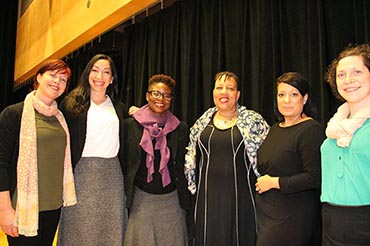On Tuesday, November 1, Bank Street hosted a film screening of Paper Tigers, a groundbreaking documentary that follows the lives of students and staff at Lincoln Alternative High School in rural Washington. Following the screening, a diverse panel of experts and practitioners took the stage to shed light on the film’s central theme—trauma-informed practice—and how it can support students, their families, and the professionals who work with them.

Paper Tigers provides a raw, powerful account of the trauma, adversity, and toxic stress that permeate the student population at Lincoln Alternative High School. The film chronicles the journeys of several Lincoln students who bravely and candidly share their stories navigating hardship, which provides viewers with a deeply humanistic look at how Adverse Childhood Experiences (ACE) can impact children and adolescents. Also weaved into the documentary are interviews with Lincoln educators and staff members, who decided to change the school’s approach to one that is trauma-sensitive, non-punitive, and addresses the emotional pain that many of their students grapple with. The model dramatically improved Lincoln students’ emotional well-being, academic performance, and overall life trajectories and has since been adopted by other high schools in Washington.
Paper Tigers is an informative, inspiring, and thought-provoking film that validates the positive outcomes of a trauma-informed approach to building relationships with students. It showcases that support from caring, dependable educators and staff can help children constructively cope with the troubles they face. The documentary sets a remarkable example for practitioners and challenges them to look past a child’s behavior and instead at what might be fueling that behavior. The panel discussion that followed the screening elaborated on several ideas touched on in the film.
“Perhaps the number one factor associated with resilience is a supportive caretaker,” said Kimberly Noble, MD, Ph.D., Associate Professor of Neuroscience and Education at Teachers College, Columbia University. “Ideally, that would be someone in the child’s home, but that may not always be the case. As educators, we need to figure out ways to step in, as in the film we just saw, to serve that role.”
Other panelists included Kara H. Ahmed, EdD, Principal of NYC Department of Education’s LYFE Programs; Karina P. Diaz, LCAT, ATR Clinical Supervisor at Bonding Links Mental Health Clinic at the Coalition for Hispanic Family Services; and Wendi Williams, Psychologist and Associate Dean at Bank Street Graduate School of Education. Troy Pinkney-Ragsdale, Director of Bank Street’s Child Life Program, moderated the panel.
Gabriel Guyton, Advisor/Instructor in the Graduate School, organized the standing-room-only event with support from Johannah Chase, Associate Dean of Innovation, Policy, and Research at Bank Street.